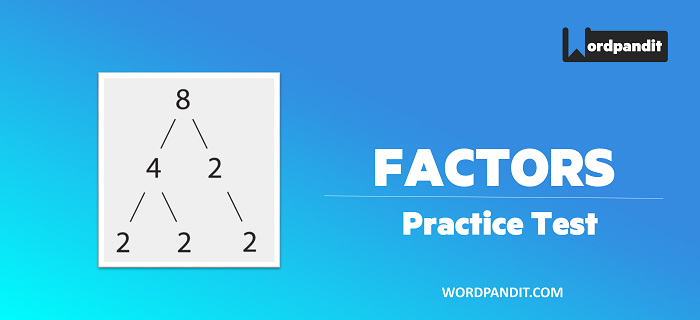- This is an assessment test.
- To draw maximum benefit, study the concepts for the topic concerned.
- Kindly take the tests in this series with a pre-defined schedule.
Number System: Basics of Factors Test-4
Congratulations - you have completed Number System: Basics of Factors Test-4.You scored %%SCORE%% out of %%TOTAL%%.You correct answer percentage: %%PERCENTAGE%% .Your performance has been rated as %%RATING%%
Your answers are highlighted below.
Question 1 |
In the number 1600, how many factors are there which are not prefect squares?
12 | |
13 | |
11 | |
14 |
Question 1 Explanation:
Factors for 1600 are= 2652 =(6+1)(2+1)=21
So the number of factors which are perfect square , 4x2 =8
How did we decide that? We know that for a factor to be a perfect square,
powers of prime numbers should be even, so number of ways that happens 20222426,50,
52 i.e (3+1)(1+1)=8
So the number of factors in 1600 which are not a perfect square are 21-8=13
Option b is the right answer .
So the number of factors which are perfect square , 4x2 =8
How did we decide that? We know that for a factor to be a perfect square,
powers of prime numbers should be even, so number of ways that happens 20222426,50,
52 i.e (3+1)(1+1)=8
So the number of factors in 1600 which are not a perfect square are 21-8=13
Option b is the right answer .
Question 2 |
How many composite factors are there in 2233557711111313?
96768 | |
96775 | |
96761 | |
96765 |
Question 2 Explanation:
We have number N= 2233557711111313
Number of factors are (2+1)(3+1)(5+1)(7+1)(11+1)(13+1)= 96768
Now there are 6 prime numbers (that is the six prime factors) are used and there is also 1,
1 is not a prime nor composite so the number of composite factors are 96768-7=96761
Number of factors are (2+1)(3+1)(5+1)(7+1)(11+1)(13+1)= 96768
Now there are 6 prime numbers (that is the six prime factors) are used and there is also 1,
1 is not a prime nor composite so the number of composite factors are 96768-7=96761
Question 3 |
Calculate the sum of all even factors of 420.
576 | |
1056 | |
1150 | |
1152 |
Question 3 Explanation:
Step 1: For even factors divide the number with 2 thus 420/2=210
Step 2: 210= 2x3x5x7 (if we multiply each factor 210 by 2 it will give the even factor of 420),
so will find the sum of even factors of 210 and then we will multiply the result with 2
Step 3: {(22-1)/(2-1)x (32-1)/(3-1)x (52-1)/(5-1)x(72-1)/(7-1)}=576
(Use formula for sum of all factors)
Step 4: 576x2=1152
Hence option D is the right answer
Step 2: 210= 2x3x5x7 (if we multiply each factor 210 by 2 it will give the even factor of 420),
so will find the sum of even factors of 210 and then we will multiply the result with 2
Step 3: {(22-1)/(2-1)x (32-1)/(3-1)x (52-1)/(5-1)x(72-1)/(7-1)}=576
(Use formula for sum of all factors)
Step 4: 576x2=1152
Hence option D is the right answer
Question 4 |
If N=120 ,then how many co-primes are there which are less than the number N
32 | |
64 | |
18 | |
40 |
Question 4 Explanation:
Since this very simple problem if you know the formulae for this
Number of co- primes to the number N and also less than N is given by N (1-1/a)(1-1/b)(1-1/c)
Step 1: Prime factorisation for 120= 23
3151
Step2: number of co-primes are = 120{(1-1/2)(1-1/3)(1-1/5)}=32.So option a is the right answer
Number of co- primes to the number N and also less than N is given by N (1-1/a)(1-1/b)(1-1/c)
Step 1: Prime factorisation for 120= 23
3151
Step2: number of co-primes are = 120{(1-1/2)(1-1/3)(1-1/5)}=32.So option a is the right answer
Question 5 |
How many pairs of factors are there for the number 900 such that they are co-prime to each other?
32 | |
64 | |
63 | |
128 |
Question 5 Explanation:
Remember these two formulas:
Number of pairs which are co-prime to each other is given by the formula for a number having two prime factors (p,q,r) : 1+(p+q)+2(pq)
Number of pairs which are co-prime to each other is given by the formula for a number having three prime factors (p,q,r) : 1+(p+q+r)+2(pq+pr+qr)+4pqr
So step1: 900 = 223252
where p,q,r = 2,2,2, respectively.
Since 900 has 3 prime factors, we use the second formula.
Step 2: put the values in the above expression and get the value 63 , so the right option is c
Number of pairs which are co-prime to each other is given by the formula for a number having two prime factors (p,q,r) : 1+(p+q)+2(pq)
Number of pairs which are co-prime to each other is given by the formula for a number having three prime factors (p,q,r) : 1+(p+q+r)+2(pq+pr+qr)+4pqr
So step1: 900 = 223252
where p,q,r = 2,2,2, respectively.
Since 900 has 3 prime factors, we use the second formula.
Step 2: put the values in the above expression and get the value 63 , so the right option is c
Once you are finished, click the button below. Any items you have not completed will be marked incorrect.
There are 5 questions to complete.
List |






